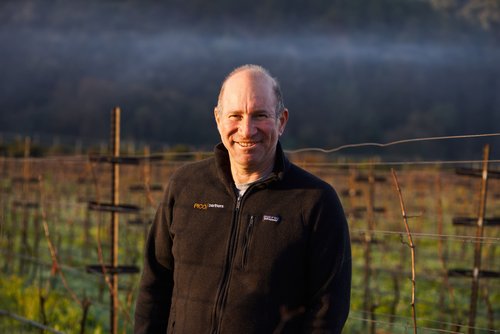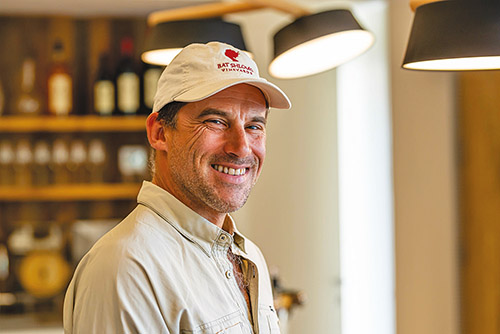


Pictured above: Ari Erle (Credit: Bat Shlomo).
The drive up to Bat Shlomo passes glorious fields and hills, and one arrives at a village that is a step back in time. It is composed of 13 homes on one street, called “Hameyasdim” (“the Founders”) and some fields in the distance. Four of those homes are owned by descendants of the original owners, we’re told by Elie Wurtman. One of the other nine is owned by him.
You can recognize Wurtman’s home by the Israeli flag flying on the low stone wall surrounding the estate, where the first thing you encounter is a beautiful paved patio with tables and chairs scattered among flowers and trees, part of the visitors’ center where people do their wine tasting in nice weather. Wurtman tells us that the dark, rich, wooden table in the indoor tasting center was created from the beams of the original home.
Wurtman is not what you’d expect from his bio. This managing partner of PICO Venture Partners who has taken five companies from founding to IPO welcomes us with a warm smile, dressed in slacks and a sweat jacket. There is nothing pretentious about him.

In 2010, Wurtman discovered Bat Shlomo— as did we, a few years ago—“by accident.” It is off the beaten track, if your real destination is Zichron Yaakov, or, further north, Caesarea. In 1888, Baron Edmond de Rothschild imported vines from the south of France to produce high quality kosher wine. He founded Bat Shlomo in 1889 and named it for his mother, Betty Salomon (Shlomo) de Rothschild. It is one of seven satellite villages built around Zichron Yaakov. Wurtman describes how the mother of the Baron de Rothschild played the true role of the Jewish mother who was involved in tzedaka and in women’s issues. She had a love of Israel and fought antisemitism.
Bat Shlomo is a beloved stop for those who love history. And Wurtman loves history, but also loves recreating the Zionist dream today. He does not just retreat to his renovated, comfortable village home to relax; he decided to create something profitable, for that is something he’s been doing his whole adult life.
“My goal,” he says, “is to build bridges and fix the world.”
He speaks passionately about, “The people, the tradition and the Land of Israel…We need a prosperous economy; this is part of the Zionist dream, settling the land.” The original Bat Shlomo had a beit knesset (a shul), a mikvah and a schoolhouse. The mikvah, which had a slick beneath it (hiding weapons from the British before and during Israel’s War of Independence) is no longer in use, but he says there is a minyan in the shul every Shabbat. “This place is the final frontier, a living museum to the pioneers.”
Wurtman came to Bat Shlomo to plant vineyards together with Ari Erle, who he met more than twenty years ago. Wurtman was in Silicon Valley on hi-tech business, but he made a detour to Napa Valley, where Erle had trained, and together they visited scores of wineries. Erle, previously of Colgin Cellars and O’Shaughnessy Winery in Napa Valley (and a former paratrooper), pours wine for visitors with a quiet smile that belies his unique and innovative touch with wine production.
Erle is meticulous in the monitoring of every step of the winemaking process, and the proof is in the product, which has been highly praised by experts. The Bat Shlomo website states that all their wines have been honored by Mark Squires of Robert Parker’s Wine Advocate, and in 2019, Bat Shlomo Vineyards was honored as one of only two Israeli wineries invited to showcase at Robert Parker’s Matter of Taste event in Switzerland.
They are devoted to a healthy ecosystem. “We use a sustainable method of growing to create a bio-diversified environment which heavily minimizes the use of spraying… Rather than spray insecticide, flowers that naturally grow between the vines bring in wasps and beetles that keep the mealybug and other pests at bay. These flowers, between the vines, act as a cover crop that add nutrients to the soil and prevent erosion.”
As guests, we sampled their exquisite wines. The grapes are grown in three vineyards that are spread over 60 dunams. Bat Shlomo’s wines include sauvignon blanc (my favorite), rose, chardonnay, “Betty’s
Cuveé” and “Regavim,” to honor a unique educational enterprise.
We also tasted some of the delicacies of Wurtman’s chef, Daniel Misan, who previously worked under one of Israel’s renowned chefs in Tel Aviv, Eyal Shani. Everything is kosher and there is no meat or poultry on the premises. They serve wild, seasonal local fish. All of the produce they use is organic and grown within a ten-mile radius of “The Farmhouse.”
And that is its name. But it is not just a retreat for the rich and famous (we were “sworn to secrecy” about guests expected the following week)—anyone interested in a high-end getaway can make reservations for one of the four luxurious suites, ranging in price from NIS 2,000 to NIS 3,500 (approx. $670- $1,170) a night, including a sumptuous breakfast. There is a heated pool and guests have the use of the living and dining area of the main house.
Wurtman encourages and supports local artists and architects. He shows us a magnificent piece of art on the wall of the tasting center, created by artist Ayala Tzur, comprising 864 pieces of earth from throughout Israel, each with the name of the place from which the earth was taken. The building was renovated and restored by Arnon Nir’s AR Studio, adhering to strict conservation standards. Wurtman points with pride to the large stones that were part of the original house.
There is a shared courtyard with rich foliage, and a swimming pool that overlooks one of Wurtman’s vineyards, with mountains in the distance. Gourmet meals are prepared by Misan upon request.
Why luxury suites in such an idealistic setting?
“People like the good life, so I decided to create the perfect place for them, but when they come here, they feel the blessing that I feel every day. I want to create this conversation within Israeli society and The Farmhouse is a platform. It’s about connecting. Back to basics. Harnessing the creativity of Israel, just as has been done in hi-tech. We need to connect Israeli society to the land.”
He has also brought his hi-tech colleagues and investors to Bat Shlomo to work in the fields.
This is part of Wurtman’s vision, which includes introducing the pioneer spirit of Bat Shlomo (and great Israeli wine) to investors and business people from around the world.
Changing One Life at a Time
But what makes him happiest is creating a social movement. For those vineyards are part of a much larger project. Since 2010, they have partnered with the “Regavim” program in Kibbutz Tirat Zvi, which is a home and a school for youth, that integrates agricultural work with academic studies.
In the beginning, he says, there were only 13 students. Today there are 150 and hundreds more have been through the Regavim-Bat Shlomo program. They work in the vineyards in order to learn a profession. “In the beginning, I knew every one of the students by name. I came here and worked with them,” says Wurtman. The work in the fields and the winery gives them not only a profession, but a sense of pride and accomplishment. Most of them, upon graduation, enter elite units in the IDF. A young man from the first Regavim group, who was an officer in the paratroopers, is today the head winemaker.
Today the Regavim students work on 30 different farms, including in the Beit She’an Valley and the Golan Heights. 20 of them work once a week in Bat Shlomo.
Wurtman: “This place is like magic. It is authentic, the kids feel pride. One can feel a love of Am Yisrael here.” Every Rosh Hashanah, he sends a bottle of his wine to the families of the young people who have been through the Regavim program. Several of them told him they used his wine under the chuppah.
One day in 2010, when Wurtman began to plant, he brought his children and his friends from the hi-tech industry to join them, so they would have the experience of planting something in Eretz Yisrael.
“This is the vision. In 2013 an archeological dig uncovered pottery, a taboon, a winepress that was 2000 years old…we’re continuing in the footsteps of our forefathers.”
In the Beginning
Wurtman’s family lived in Philadelphia and he grew up in a home with parents who had a love of Israel; they made aliyah when he was eight years old. His late father, Stuart, was president of the Union of Councils for Soviet Jewry; his mother Enid was also an activist for Soviet Jewry and lives in Jerusalem today.
In the army, Wurtman served at the Allenby Bridge, where he had to interact with the UN and with border crossings from Jordan. He has bachelor’s degrees from Columbia University and the Jewish Theological Seminary.
One of Wurtman’s formative life experiences took place when he was in the army during a project called “Education Week.” On the last day, every participant had to present his project. Wurtman won, and has a photo with Stef Wertheimer—an Israeli billionaire industrialist, philanthropist and former politician—who was one of the judges, to prove it. “It was about creating prosperity,” he says, “and those five minutes with Stef gave me a framework for my perspective on Zionism, Israel and building industry.”
“Jobs bring community. It’s about having an ideological framework; a mission; meaning and purpose.” Wurtman quotes the Rambam, who says that the highest level of tzedaka is helping a person to become self-sufficient, to earn a living. “I judge if a year has been successful based on the number of jobs I’ve created for people.”
Whether you live in Israel or are anticipating your next visit, plan to take a drive to Bat Shlomo and bask in the pastoral pioneer atmosphere, over a wonderful glass of wine.
More details about the Farmhouse here: https://thefarmhouse.co.il/ and the Winery here: https://www.batshlomo.com/. The reviewer is an award-winning journalist, artistic director of Raise Your Spirits Theatre, and editor-in-chief of WholeFamily.com. Published previously in The Jerusalem Report.









